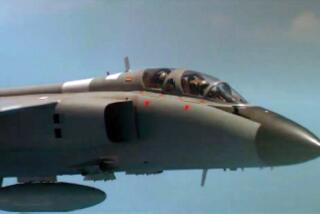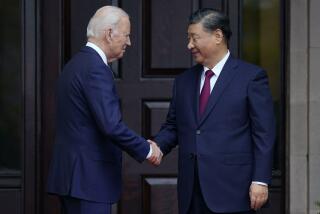U.S. Pushes for Response From China
- Share via
UNITED NATIONS — The United States pressed China on Wednesday to explain reports that its workers, violating international sanctions against Baghdad, installed equipment that helped the Iraqi military better target allied air patrols, a State Department spokesman said.
“We have raised with China our specific concern about reports of fiber-optic cables and telecommunications projects in Iraq,” spokesman Richard Boucher said. “I would say we are still awaiting a detailed response.”
Secretary of State Colin L. Powell confronted China’s ambassador to the U.S., Yang Jiechi--who was presenting his credentials in Washington on Wednesday--with information that Chinese technicians helped lay cable for an antiaircraft defense system south of Baghdad.
Washington had cited a sudden increase in the frequency and accuracy of attacks on aircraft of the United States and Britain monitoring a “no-fly” zone in southern Iraq as the reason for the two nations’ bombing raid Friday. The allied jets specifically targeted radar and communications facilities for the newly upgraded air defense network, defense officials said.
Although it had close military cooperation with Baghdad before the U.N. sanctions were imposed more than a decade ago, China denied any current involvement with the Iraqi military.
“This is a rumor, an excuse for the U.S. and British bombing of Iraq,” said Shen Guofang, China’s deputy representative to the United Nations. “China does not have any military or civilians working in Iraq.”
Wednesday’s meeting marked the third time the U.S. has prodded China over the issue. In early January, Assistant Secretary of State David Welch issued a diplomatic demarche during a visit to Beijing, and Powell pointedly emphasized to Shen the importance of supporting sanctions during a visit to the U.N. last week.
“The denials have been very thin, with no attempt to address it in detail,” a U.S. government official said. “Obviously, we’re turning up the heat.”
If Washington isn’t satisfied with Beijing’s reply, officials said, the U.S. will take the complaint to the U.N. sanctions committee. Under the sanctions, levied after Iraq invaded Kuwait in 1990, all military-related goods are banned from import into Iraq, and all commercial items must be vetted by a U.N. committee to ensure that they cannot be used for military purposes.
U.S. and U.N. officials said there is no Chinese telecommunications equipment approved for use in Iraq--for civilian or military purposes--suggesting that the importation of fiber-optics would violate the sanctions.
At least one Chinese telecommunications company, Huawei Technologies, maintains an office in Iraq, and official delegations from Iraq have visited Huawei’s headquarters in southern China and placed orders several times in the past year, according to Chinese press reports. While there is no evidence that Huawei workers are the ones allegedly involved in laying a network, its strong links to the Chinese military mean it is closely watched by the U.S. and by U.N. monitors.
If the accusations prove unfounded, it would not be the first time faulty intelligence has led to a diplomatic imbroglio. In 1999, U.S. aircraft bombed the Chinese Embassy in Belgrade during the North Atlantic Treaty Organization’s air campaign against Yugoslavia, killing three people and injuring 20. China still doubts that the bombing was accidental.
More to Read
Sign up for Essential California
The most important California stories and recommendations in your inbox every morning.
You may occasionally receive promotional content from the Los Angeles Times.













